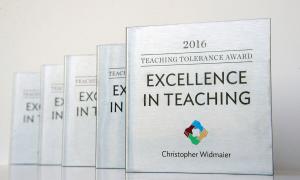201 Results
Commit to Building a Just Future
Children should have the right to safe, affirming and inclusive schools. To uplift Banned Books Week and to honor LGBTQ+ History Month, support young people’s freedom to read, learn and build a just future.
- Exclusion Is Unconstitutional
- Building a Just Future
- ChangeMakers for an Inclusive and Just Future
Art as Resistance, Part 2
And the Winners Are...

Understanding 'Brown' in the Context of Inclusive Education
May 17, 2024, marks the 70th anniversary of Brown v. Board of Education of Topeka, Kansas, one of the most significant Supreme Court decisions and a major victory for the Civil Rights Movement. We must, however, resist the simplified narrative of the end of segregation and teach a more comprehensive story that includes analyzing Brown’s complex impact, the opposition to desegregation, and the ongoing movement for inclusive education.
- Connecting the ‘Brown’ Decision to Today’s Social Justice Movement
- Burning 'Brown' to the Ground
- Teaching the Civil Rights Movement
Honoring International Holocaust Remembrance Day
On this International Holocaust Remembrance Day — which marks the 80th anniversary of the 1945 liberation of Auschwitz-Birkenau — we honor the memory of the 6 million Jews and the millions of Roma, Sinti, Slavs, disabled persons, LGBTQ+ individuals, political dissidents and others who were murdered in the Holocaust. The world lost the perspectives and contributions of millions of individuals because of hate.
- Acclaimed Documentary ‘One Survivor Remembers’ Urges All to Never Forget
- Inspiring Hope: A Conversation With Maud Dahme
- ‘Never Again’ Starts With Education
Puerto Rico: Decency, Outrage and Collective Power

Your Trans Students Need You

Teach This: Politics and History Textbooks

